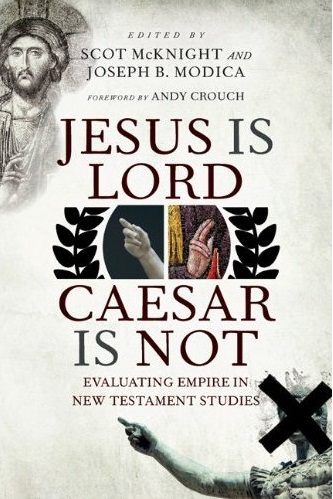Last week I gathered together with a small group of theology students on a Tuesday evening to have a dialogue with my colleague Dr. Joe Modica (chaplain and assoc prof of NT at 
 Eastern) about his new book, co-edited with Scot McKnight, Jesus is Lord, Caesar is Not: Evaluating Empire in New Testament Studies (IVP 2013). Because I am “in” with a co-editor, IVP sent me a copy (even before Modica got his author/editor copies!). In this initial post, I will give a brief overview of the what this book is trying to accomplish. In the next post, I will give my own thoughts on “empire studies” and its benefits. (Spoiler: I do think that some empire scholars have imported things into NT texts that don’t belong there, but I think empire studies is much more important than the contributors and editors of this book think. I think the way we have framed the discussion makes it harder to understand how important imperial issues are to Biblical theology.)
Eastern) about his new book, co-edited with Scot McKnight, Jesus is Lord, Caesar is Not: Evaluating Empire in New Testament Studies (IVP 2013). Because I am “in” with a co-editor, IVP sent me a copy (even before Modica got his author/editor copies!). In this initial post, I will give a brief overview of the what this book is trying to accomplish. In the next post, I will give my own thoughts on “empire studies” and its benefits. (Spoiler: I do think that some empire scholars have imported things into NT texts that don’t belong there, but I think empire studies is much more important than the contributors and editors of this book think. I think the way we have framed the discussion makes it harder to understand how important imperial issues are to Biblical theology.)
Contrary to what you might guess, this book is not an out-and-out critique of “empire studies.” It is more of an occasion, now after a couple of decades of the boom of this discipline, to take stock of where it came from, how methodologically sound it is, what its benefits are for Biblical interpretation, and in what areas and ways it may need to be reined in hermeneutically a bit tighter. In that sense, the book intends to be, and comes across as, an irenic critique.
McKnight and Modica co-authored the introduction and conclusion. Sandwiched between we have 10 main chapters.
 “We Have No King But Caesar: Roman Imperial Ideology and the Imperial Cult” (David Nystrom)
“We Have No King But Caesar: Roman Imperial Ideology and the Imperial Cult” (David Nystrom)
“Anti-Imperial Rhetoric in the New Testament” (Judith Diehl)
“Matthew” (Joel Willitts)
“The Gospel of Luke and the Roman Empire” (Dean Pinter)
“John’s Gospel and the Roman Imperial Context” (Christopher W. Skinner)
“Proclaiming Another King Named Jesus? The Acts of the Apostles and the Roman Imperial Cult(s)” (Drew J. Strait)
” ‘One Who Will Arise To Rule Over The Nations’: Paul’s Letter to the Roman and the Roman Empire” (Michael Bird)
“Philippians and Empire: Paul’s Engagement with Imperialism and the Imperial Cult” (Lynn Cohick)
“Colossians and the Rhetoric of Empire: A New Battle Zone” (Allan Bevere)
“Something Old, Something New: Revelation and Empire” (Dwight D. Sheets)
There is a foreword by theologian Andy Crouch which eloquently offers a broader statement that fits the perspective of most of the contributors. Crouch writes:
After all the scholarly examination is done, even with a stiff tailwind of intellectual fashion propelling the quest for signs of anti-imperial sentiment, it seems that the only fair conclusion is that there is a surprisingly small place in the New Testament writers’ attention for denunciations of Caesar, explicit or otherwise…The way of Jesus’ first followers was not to blaspheme Artemis or to denounce Caesar–it was to proclaim Jesus.
To put it another way, to say ‘Jesus is Lord’ does not seem actually to entail saying “Caesar is not [Lord].’ Rather, it entails not saying “Caesar is Lord.’ This minute grammatical distinction, simply a matter of where the negation is placed, seems to me to explain so much about the New Testament witness. The affirmation ‘Jesus is Lord’ requires not so much a strident denunciation of earthly lords as a studied silence concerning their pretensions. The answer to Caesar’s inflated claims of significance is further proclamation of Jesus the Messiah’s real significance (13).
A more directed methodological critique is raised by editors McKnight and Modica in the conclusion where they cite Maslow’s dictum: “If the only tool you have is a hammer, you tend to see every problem as a nail” (see Morna Hooker’s oft-cited essay “On Using the Wrong Tool”). So, “If all one sees is the Roman Empire while reading the New Testament, then everything becomes empire criticism.” (211). Here is their concluding statement:
We believe that the New Testament writers do indeed address the concern highlighted by empire criticism. But we also strongly suggest that this is not their primary modus operandi. The New Testament writers are cognizant of Roman occupation, aware of Roman customs and laws, but they fundamentally understand Jesus’ inaugurating of the kingdom of God in direct opposition to and in contrast to the kingdom of Satan (see Mt 12:26; Lk 11:18). The kingdom of God exemplifies redemption and life; the kingdom of Satan exudes sin and death. [Seyoon] Kim aptly notes: ‘Jesus fights the kingdom of Satan and redeems the sick out of it, but he does not fight the Roman imperial system and does not redeem the victims of its evil rulers’ (p. 212).
Some of the writers are more insistent that anti-imperial concerns are not present in the text (see, for example, Skinner’s chapter on John). Others recognize its presence, though caution against over-reaching (Bird on Romans, or Sheets on Revelation). This book represents a natural desire to sort out what the actually benefits and liabilities are of empire studies after the “we found something new” enthusiasm has died down.How much of it is scholars doing what scholars do best – coming up with theories that explain things?
Now, I have my own thoughts on empire studies, but I thought, in this post, to say a couple of words about this book itself. First of all, it is well planned and the introduction and conclusion do a great job of giving the reader a sense of closure as the editors take stock. Some of the main chapters are more thoroughoing than others, and some more cogent than others, but overall the kind of case is made relatively well for what McKnight and Modica say in the conclusion.
If there are a couple of things I was left desiring it was these:
-First, I think we should make a distinction between the kind of empire criticism done by people like Horsley (on the more extreme end) and that done by people like Michael Gorman (who is more balanced and moderate). Both of these men represent “empire studies” (I would argue), but what McKnight and Modica evaluate is primarily the former. I want to be careful not to throw the baby out with the bathwater just because the most vocal proponents distract us from the actual wider membership and scholarship of this group.
-While they address 8 books of the NT (Matthew, Luke, John, Acts, Romans, Philippians, Colossians, and Revelation), I was disappointed not to see 1 Peter discussed. It seems like the perfect opportunity to see a key NT text deal with “Church and Culture” issues, theology and politics, engagement and power. Because of the Balch-Elliott debate, and contributions by theologians like Miroslav Volf, it would have been interesting to see what an analysis of the study of this letter would produce. There is much controversy over both the language of ktisis in 1 Peter 2:13, and the purpose of the household codes, that it would have made for a fascinating test case.
I would recommend this book to anyone who is (obviously) interested in how scholars do historical study and biblical interpretation together, but it is also very insightful regarding how we evaluate our own discipline and how we weigh the strengths and weaknesses of wider academic trends.
In the next post I will offer my own perspective on this issue of the validity and benefit of empire studies.















